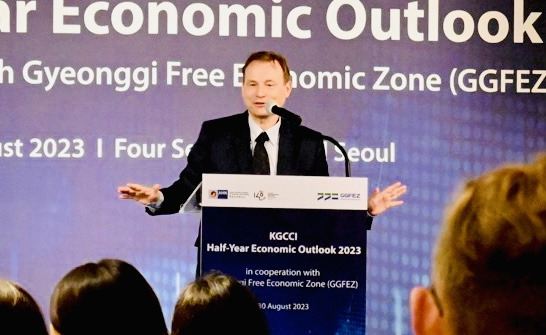German ambassador-designate stresses balanced economic growth
By Sanjay KumarPublished : Sept. 4, 2023 - 17:28

German Ambassador-Designate to Korea Georg Schmidt stressed the importance of pursuing balanced economic growth to address the diverse social needs arising from demographic and climate changes.
“We have to rethink how we balance this growth with the social requirements of demographic change and the challenges of sustainability and climate change," he said at the Korean-German Chamber of Commerce and Industry's (KGCCI) Half-Year Economic Outlook 2023 on Thursday.
Highlighting how contemporary global conflicts due to economic interdependence differ from the Cold War era's bloc-based confrontations, Schmidt noted that Germany and Korea now have substantial economic dependencies, particularly with regard to China, and lack a clear strategy to balance security concerns with economic interactions.
Germany has recently adopted its first-ever national security strategy in June 2023, outlining a comprehensive approach, he said, expressing optimism about significant similarities with both German and Korean companies leading the way.
Germany views China as a partner, competitor and systemic rival, according to its national security strategy.
Schmidt, however, acknowledged that achieving double-digit economic growth, as seen in the past, might be more challenging now.
He touched upon demographic changes, work-life balance, and environmental sustainability and stressed finding solutions through the natural sciences, including climate action, economic security and renewable energy.
Schmidt also highlighted the significance of non-material factors, like spirituality and human connections, in contributing to people's happiness and suggested that cultural exchanges could broaden perspectives and enhance well-being.
"(People-to-people) exchanges may open some Koreans' minds about it and some Germans' minds about what else can be done," he added.
Co-hosted by the KGCCI and the Gyeonggi Free Economic Zone Authority (GGFEZ), the event shared insights on Korean-German economic ties amid challenging times with more than 80 key officials and experts from Korean and German companies and institutions in attendance.
The event also had insights from a Bank of Korea Monetary Policy Committee member, Suh Young-kyung, Deutsche Bank Asia Chief Economist Juliana Lee, and Germany Trade & Invest (GTAI) Director and Correspondent Frank Robaschik.



















